- Home
- Al Sarrantonio
The Boy With Penny Eyes
The Boy With Penny Eyes Read online
THE BOY WITH PENNY EYES
By Al Sarrantonio
First Digital Edition published by Crossroad Press
Copyright 2011 Al Sarrantonio
Cover design by David Dodd / Copy-Edited by Patricia Lee Macomber
Part of the cover image provided by http://indigodeep.deviantart.com/
LICENSE NOTES:
This eBook is licensed for your personal enjoyment only. This eBook may not be re-sold or given away to other people. If you would like to share this book with another person, please purchase an additional copy for each person you share it with. If you're reading this book and did not purchase it, or it was not purchased for your use only, then you should return the vendor of your choice and purchase your own copy. Thank you for respecting the hard work of this author.
ALSO FROM AL SARRANTONIO & CROSSROAD PRESS
Novels:
Moonbane
Skeletons
October
West Texas
Kitt Peak
Collections:
Toybox
Halloween & Other Seasons
BUY DIRECT FROM CROSSROAD PRESS & SAVE
Try any title from CROSSROAD PRESS. Use the Coupon Code FIRSTBOOK for a onetime 20% savings! We have a wide variety of eBook and Audiobook titles available.
Find us at: http://store.crossroadpress.com
For Michael
MERCUTIO: There was a boy with penny eyes.
ADANO: Was he made for death?
MERCUTIO: I know not. My story will tell . . .
—The Romance of Adano, 1301
The
End
He was a young boy with a pack of cigarettes, and he took one of the cigarettes out of the pack and put it in his mouth. He struck a match, close to the ground, shielded it with his cupped hand from the wind, and then he lit the cigarette and shook the match out and threw it in the dust.
Even now, at the end of the day, the desert was hot. The dry dust held the heat and let it drift up at him. He ignored it. Hours before, he had removed his black golf jacket and folded it neatly on the ground next to him. In a few hours, when the desert lost its heat, he would unfold it and put it back on, turning up the collar. But that would not keep the ache out of his legs, which always felt the cold now.
He blew the cigarette smoke out discreetly, letting it go in near invisible breaths. He lay down on his stomach and brought his binoculars up to his eyes.
The town at the bottom of the long slope was as quiet as if it were midnight. He swept the glasses quickly back and forth, stopping to study the front of the house and various points at the perimeter of the town. Nothing moved. He put the binoculars down again and rolled over onto his back. He took a deep drag and found that the cigarette had gone out. Throwing it aside, he put his hands behind his head, closing his eyes and then opening them to stare at the purpling sky overhead and the growing bulb of Venus that would soon be joined by a thousand mantling stars.
The boy's name was Billy Potter. He thought about who he waited for in the town below.
He thought about who he would kill later this night.
1
The day he left home his mother was drunk. She was almost always drunk. Usually she would begin at noon, with the advent of the soap operas, gently milking a bottle of scotch throughout the day and into the night, but today she was drunk by early afternoon. She was sitting in the rocker in her bedroom, talking to Billy as if he were there.
"Good boy," she cooed, "my little Billy boy. Does he love his momma? Does he love her?" The rocker moved back and forth in the darkness. "Does he kiss her up and tell her he loves her?" She embraced herself, imagining that he was doing this and telling her how he needed and loved her, what he had done that day at school, what he wanted for his birthday. "Will he give his momma a kiss?"
She stood abruptly, knocking the scotch bottle over onto the thick carpet and spilling what was in her glass. She dropped the glass onto the carpet and stood all the way up. In the living room she heard the television talking to itself. What time was it? Two? Three? The blinds were closed in the bedroom and she pinched two slats open to look outside. Dark. Gray and raining. Four o'clock? Did it matter? "Little Billy boy," she muttered, and took a few halting steps toward the door, finding the knob and then leaning against the door for a moment without opening it. "Kiss your momma, Billy boy," she whispered, closing her eyes and actually falling asleep momentarily. She began to slip down the door, then woke up, leaning back and pulling it open.
The hall light was on, and she blinked into the brightness. She was steadier. Straight ahead was the bathroom, and just to the right of that was Billy's room. The door was closed, a soft line of light visible under it.
"Billy?" she said, her voice not much above a whisper, stepping toward the closed door. "Billy?"
There was no answer.
She put her fingertips to the knob, wanting to grasp it firmly but holding back. A need in her so strong it overwhelmed her made her lean against the wall, and she began to sob. She wanted more than anything in the world to throw open the door, rush into the room, and hold him to her tightly; wanted to kiss his face and hands and call him her own Billy boy. The need was so physical and immediate that it, and the alcohol, overruled her sense and she opened the door and went in.
The lights were on in the room, all of them, including the reading lamp over his hard-backed chair in the corner. He was sitting in the chair, and he looked up at her as she stumbled in.
She almost muttered an apology, but the alcohol, and the need, again overtook her and she approached him. "Billy . . ." she began, holding her hands out, but all at once she realized what she was doing. He looked up at her, silently. Those eyes of his . . .
She stood still, suddenly not knowing what to do, her hands coming alive on their own, wanting to reach out at him, clutch him to her, but instead fluttering out before her and then dropping to her sides. She hugged herself. She felt like a trapped, cornered animal. He was looking at her with those eyes. What did those eyes mean? They were not accusatory, not hateful, not loving, not warm, not cold. They were the eyes of something from somewhere else. They could not be human eyes.
"Billy," she said, and abruptly she began to sob into her hands, those uncontrollable appendages that said more sometimes than eyes or face ever could. She dropped to her knees before him, crying without control, for herself, for him. "Billy, Billy," she sobbed, and she felt no hands upon her to comfort her. She knew that if she looked up at this moment, she would see him calmly watching her. If he spat upon her, it would be better, since then she would know what kind of monster he was, be able to place him in her heart and act from that knowledge. But to not know what he felt, what he was . . .
She opened her eyes; he was watching her as if she were an insect under a magnifying glass. Or was he? Her heart leapt, for there was a glint at the corner of his eyes, wasn't there? A tear? Something human?
It was gone in a moment, and it may well have never been there. The eyes were blank as glass, silent and calm as the light of candles, and she doubted if she had seen what she thought she had. Could this really be her son? Could this cold thing masquerading as a little boy really have come from her warm flesh?
The alcohol mastered her.
"Billy," she said, pulling his small body against her.
"Mother," he said evenly.
She pushed back from him, her eyes wide. "You're a monster!" she screamed. "How can you be my son? Who are you?"
His eyes regarded her emotionlessly.
"Who in God's name are you!" She slapped him, harder than she'd thought she could. His head snapped to one side, and then slowly came back to face her again.
"Oh, Billy
," she began, gasping at what she had done, but then her voice rose. "No!" she shouted. "I'm not sorry! How could I be sorry? Do you know," she said, half hysterical now, backing to the wall and leaning against it as she railed at him, "that your father left because of you? He couldn't stand being around you. You made him afraid. You scared him. Do you know that when I was carrying you, before you were born, you were cold inside me? I had nightmares about you, that you were dead in my womb, or that you were alive and something worse." Tears were streaming down her cheeks, streaking her mascara, and she was spasmodically smoothing back her hair with her hands. "Once, I dreamed that I was on the delivery table, and you were born, and when you came out of me, you weren't a baby. You were an old man with a wrinkled face, slowly pulling yourself out from within me with gnarled root-hands. And then when you were really born, when I came out of the drugs, and the doctor looked down at me, I thought for sure that you were stillborn. It was the way the doctor looked at me. I began to cry but he told me it wasn't that, and when I asked him what was wrong, he told me everything was fine. But I knew something was wrong." His eyes were turned toward her, hooded under the reading lamp, staring at her dispassionately. "And then they brought you to me, and I held you up and looked you over, head to toe, and there was nothing wrong with you at all until I held you up over me and looked into your eyes." She had almost forgotten he was there now, she had bottled up these thoughts for so long that she just spilled them out, to herself, to him, to no one. She looked at him again, and there was as much fear in her voice as anything. "Your eyes were like copper pennies—dead man's eyes. That doctor saw it, and I saw it, and your father saw it." She sobbed into her hands quietly for a moment. "All the trouble started then, all the trouble. Your father drunk and gone, and me like this, all the trouble . . . All I wanted was a little boy!" she screamed. "All I wanted was a little Billy to kiss and hold!"
She rushed at him, holding her fists above him and screaming into his face. "I hate you!" The fists were poised, the muscles straining in her arms and in her clenched hands. "I hate you! You're not my little Billy."
Her fists relaxed and she fell to her knees on the carpet in front of him, covering her face with her hands. "Oh, Billy, why can't you be like that day at the ocean? I love you so much."
Something churned in her stomach. She rose with a cry, stumbled to the bathroom, and knelt over the bowl. She vomited, scotch pumping out of her like rejected poison. Her stomach heaved, and suddenly she was very weak. She made her way, half senseless, to the hallway and into the bedroom, and collapsed onto the bed, her arms over her eyes, crying weakly, "Billy, Billy," until she faded into rough sleep.
2
He left an hour later. He rose quietly and packed a small bag, taking a blanket, a few cans of food, some fruit, and a bedroll his father had bought the year before he left, when he had said they might go camping together, and he took an extra shirt. There was a box in the upper right-hand corner of his dresser, filled with dimes and dollars and quarters, and he emptied it, putting the coins into his two front pockets and the bills in his back pocket.
The afternoon was gray and chilly. There was rain left in the air, but by the feel of things the sky would clear before long and there would be autumn sunshine. He had a long walk to the bus station. There was no one else out except a few kindergarten children running noisily home. The only other signs of life were a few chirping birds and a newspaper truck that grumbled past him and then disappeared. He cupped his jacket about his neck, flipping up the collar, and walked on.
The bus depot was empty except for the sleepy clerk behind the counter. Billy put down the exact fare and got the ticket he requested. Immediately he went out to the bus that stood with its door open, its interior lights lit against the still-gray sky. The driver was just lifting the plastic white lid off a cup of steaming coffee. He barely glanced at Billy as he took the boy's ticket and waved him into the back. "Any seat you want, sport," he said, and then snapped open his newspaper. Half an hour later the bus left, with only six passengers aboard.
By the time the bus passed through three more towns, the sun was out and there were twenty passengers on board. By late afternoon, it was nearly full and out on the highway. Billy sat in a window seat two-thirds of the way back, his eyes staring at the passing scenery. A woman dressed like a librarian sat down beside him and tried to engage him in conversation. He ignored her and she soon lost herself in a crochet project that she unfolded from her enormous handbag.
As the sun went down, directly in his line of vision to the west, he took a small apple from his pack and ate it silently, packing the core into a napkin and storing it in his pocket. He turned again to the window, where the western sky was violet.
"Are you on your way to visit a relative?"
The question came from the woman next to him. He turned and saw her looking steadily at him, her crochet work completed in her lap. He turned back to the window.
"You're traveling all by yourself?" Her voice was kind but probing.
He nodded, not turning away from the window. Outside, a row of white clapboard houses, all alike but for different-colored shutters, flashed by, blowing in the dusk, and then a line of small-town stores: hard-ware, bar, Woolworth's, McDonald's. Then another row of white houses.
"It's stopped raining," the woman commented. "This afternoon I thought it would never stop raining."
Again Billy nodded.
There was silence for a moment.
"Who are you running away from?" she asked in the same matter-of-fact tone. Billy ignored her.
"I said, who are you running away from?" Her voice was quiet, but she placed a hand on his arm, then moved it to his chin to turn his face toward her. She did it gently, but with firmness.
"Who?" she repeated, giving the word a short, hard inflection.
Billy stared at her.
"Don't use those eyes on me," she said. "I saw right away those eyes have power. Speak."
Billy said nothing for a moment, then said, "I left home."
She looked at him blankly, waiting for him to go on.
"I left my mother."
She had a strange face, stern yet softly formed. It was the kind of face you saw on women who worked farms alone all their lives, whose husbands had been killed in some war or other. Weather-beaten faces still in some awe of the world, worn but still filled with hardness and life. She looked to be fifty or sixty years old.
She regarded him quietly for a few moments, then pursed her lips and nodded. "That I believe," she said. "Nothing worse, maybe. From the look of you, I thought you were running from something bad." She opened her baggy purse, which was made of silk-like material with a brass twist at the top, and rummaged, finally taking out something small, yellow, and hard.
"Put this in your mouth," she said.
She set it in Billy's hand and waited.
"It's only a lemon drop," she said, lifting his hand until he took it under his own control and put the candy in his mouth. "Good," she went on. "Now we have to decide what to do with you."
Billy started to look away, out the window again, but she pulled him around roughly.
"You'll listen to me," she said, and now her voice was not so gentle. "You've got a bad look about you. I don't like that. I can feel something going on inside you." She delved into her bag again, taking out another yellow candy, which she put in her own mouth. "Have you done something wrong?"
After a moment, Billy shook his head.
"Stealing, cheating, something like that?"
"No."
She sighed. "Worse?" Her voice was as persistent as water running over rock.
"No," he said.
"You sure?" She sounded almost worried.
He stared at her.
She shook her head and squeezed his arm. "You're lying to me," she hissed. There were tears pooling in the corners of her eyes.
"I'm not lying," he said.
She let his arm go.
She looked away from h
im for a moment.
Her body was trembling. She slowly brought herself under control before speaking to him again. "You'll have to excuse me. It disturbs me that you're lying to me. It's in your eyes. I've seen other eyes like yours. They were on boys that made me cry, too." She turned away, then turned back to him and said harshly, "How old are you?"
"Eleven."
"God." She took hold of him suddenly, and drew him to her, holding him. "What could have happened to you in eleven years?" She let him sit up again, shift away from her. She was talking more to herself now than to him. "I've seen boys and girls whose parents did things to them I could never imagine. Sex things, and beatings, and worse. I found a boy once who had been locked in a room for three years without ever seeing the sun. Three years without sunshine. He was pale as ivory. His eyes were so hurtful of daylight that he had to wear sunglasses whenever he went out. I found a little girl whose father had shaved her head so that she'd look like a boy, then he beat her twice a week with a hose, calling her his whore-boy." She was nearly crying.
She caught herself and looked at Billy again. "You don't have to tell me," she said quietly. "Not now."
When they reached a town called Petersboro, she got her suitcase down from the rack above and took Billy's backpack in her other hand. She got out into the aisle, ignoring a grumbling passenger behind her who wanted to get by, and waited for Billy to get out in front of her. He did so slowly, and she kept close to him when they departed the bus.
"This way," she said sternly, indicating with her head that they should move past the line of taxis and passengers waiting to board. "We'll walk it."
They soon passed onto a country road bordered by low fences and uncropped hedge. There was a near-full moon out to guide them. The road turned into a dirt lane lined by oaks. The rain had plastered falling leaves to the ground, making a wet carpet. "You getting cold?" she asked him, seeing that he seemed to be shivering in his golf jacket. He said nothing, and without a word she removed the shawl she wore over her coat and put it around him.

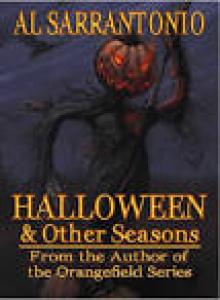 Five World Saga 01 Hornets and Others
Five World Saga 01 Hornets and Others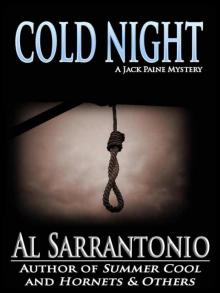 Cold Night (Jack Paine Mysteries)
Cold Night (Jack Paine Mysteries)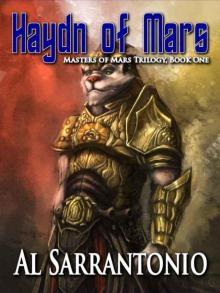 Haydn of Mars
Haydn of Mars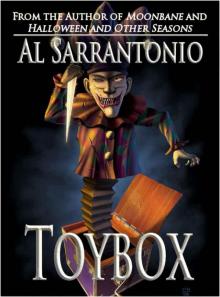 Toybox
Toybox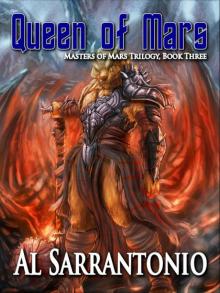 Queen of Mars - Book III in the Masters of Mars Trilogy
Queen of Mars - Book III in the Masters of Mars Trilogy Exile
Exile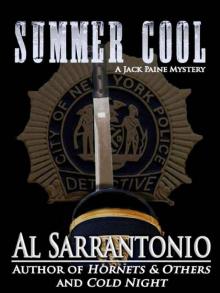 Summer Cool - A Jack Paine Mystery (Jack Paine Mysteries)
Summer Cool - A Jack Paine Mystery (Jack Paine Mysteries) Return - Book III of the Five Worlds Trilogy
Return - Book III of the Five Worlds Trilogy The Orangefield Cycle Omnibus
The Orangefield Cycle Omnibus Summer Cool jp-2
Summer Cool jp-2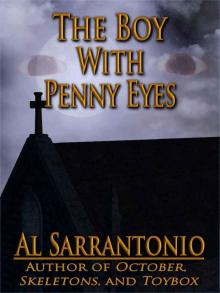 The Boy With Penny Eyes
The Boy With Penny Eyes Journey - Book II of the Five Worlds Trilogy
Journey - Book II of the Five Worlds Trilogy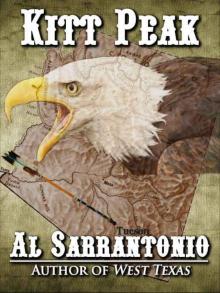 Kitt Peak
Kitt Peak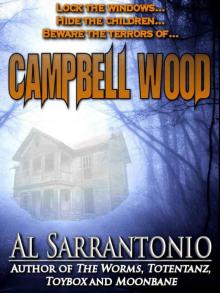 Campbell Wood
Campbell Wood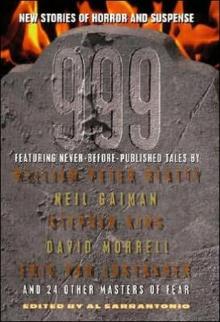 999
999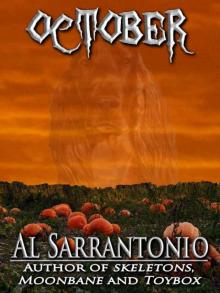 October
October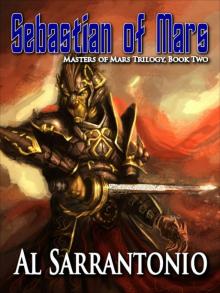 Sebastian of Mars
Sebastian of Mars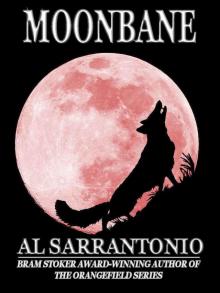 Moonbane
Moonbane Totentanz
Totentanz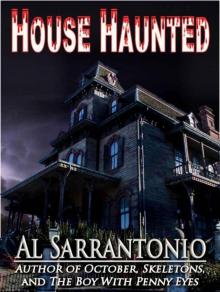 House Haunted
House Haunted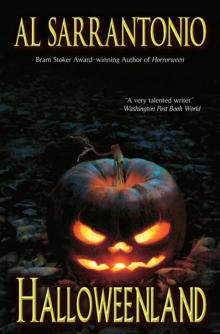 Halloweenland
Halloweenland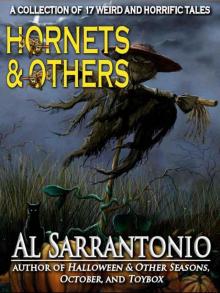 Hornets and Others
Hornets and Others